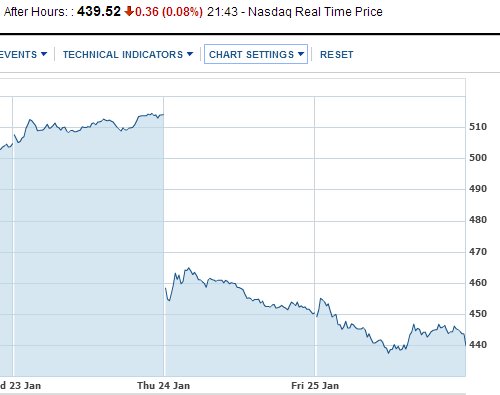What you need to know about Apple's tanking share-price and tumbling market cap

Apple's latest financial results looked good, but the effect they had on the share price was very bad indeed, and almost instantly knocked about $50 billion off the company's market value. And while Apple results quite often lead to big swings in after-hours trading, the share price continued to fall the next day, even when the grown-ups were at their desks.

At the time of writing, Apple's share price has plunged by more than 12 percent from $514.18 to $439.52, and a couple of hours ago, they hit $437.63. This is around 40 percent down from last September's all time high of $705.07, when the company's market value was $658 billion. It's now around $413 billion, which represents a loss of $250 billion -- somewhat more than one whole Microsoft ($234.65 billion).
Apple has lost its position as the world's most valuable corporation to Exxon, which is currently worth $417 billion. That may still be the case by the time you read this, or it may not. Share prices can go up as well as down.
It's obvious that the fundamentals of Apple's various businesses have not changed this week, but three things have changed: sentiment, momentum and guidance.
Wall Street didn't hate Apple's numbers, it's just that they were a bit lower than some expected. Worse, Apple's "future guidance" was also below analysts' expectations. Put the two together and it can be enough to knock 10 percent off the share price. It happened in January 2008 (shares down 11.4 percent), for example.
The problem is that Apple has done these two things three times in a row. After the July 2012 results, the stock fell by 0.2 percent, before surging on, and after the October 2012 results, it fell by 5.1 percent. The latest fall of more than 12 percent simply continues the pattern. (Hindsight is wonderful.)
What is perhaps more surprising is that the share price hasn't recovered. I put this down to a change in sentiment, and a loss of momentum. Apple's share price factors in a rapid growth in sales at extraordinary profit margins. The success of Android in general, and Samsung in particular, makes that seem somewhat less likely today. Sentiment is down.
There are still plenty of analysts who think Apple shares will go higher, including Apple-will-make-a-TV fan Gene Munster. He's lowered his target share price from a recent high of $910, but it's still $767. Today, Goldman Sachs lopped $100 off its 12-month price target, but it's still $660. That would represent a $247 profit.
However, speaking on CNBC yesterday, DoubleLine boss Jeffrey Gundlach predicted that Apple shares will continue to slide, and will hit $425 this year. "I really think it's ultimately going through that number," Gundlach said. "I think this is really a broken company that's incredibly over-owned."
By "over-owned", he means that too many investors are holding too many Apple shares. If you spread your investments over a lot of companies, then you will make some gains and some losses (swings and roundabouts), but you probably won't meet with disaster. However, Apple shares gained so much momentum -- the price kept going up and up -- that buying Apple looked like a sure-fire way for fund managers to make money.
The value of your fund would go up along with the price of Apple shares, ahead of the market average. Your investors would love you. You would earn huge bonuses. Rolexes all round.
This strategy worked perfectly until it didn't.
When the wheels come off a bandwagon, fund managers may sell shares to lock in their winnings. If they bought Apple before the end of 2009, they’ve more than doubled their money. If they bought before the end of 2011, when the share price was $420, they are still in profit. If they piled in when it was fashionable last year, at $600 to $700 a share, they're in a hole. Just hope your pension fund isn't in the hole with them.
If lots of investors sell shares, the price goes down, of course. This is fine. Fund managers with cash in hand may then try to spot the bottom, so they can buy back shares that will soon soar up to $634.55 (the analysts' consensus target) or even $1,000 (the Apple fanboy dream).
According to Yahoo Finance, 48 analyst companies say Apple is a Buy or Strong buy, and only one is saying Sell. That may change, but at the moment, analysts are predicting that Apple's shares will recover most of their price, or maybe even more.
Either way, Apple has not suddenly gone off a financial cliff. Or at least, not yet.
Disclaimer: Please note that I do not deal in shares, I do not own any Apple shares, and I am not going to buy any Apple shares. Also, I am totally unqualified to give financial advice, so I don't. Any predictions I may accidentally have made in the past have been staggeringly wrong. No sensible person would trust me with their lunch money.